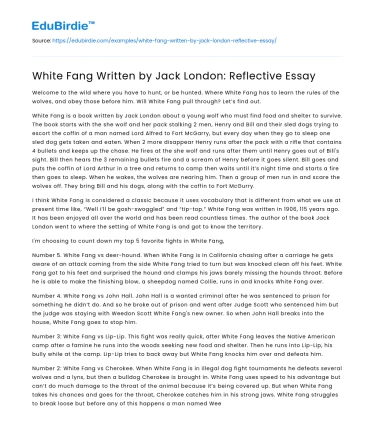Introduction
Jack London’s novel, White Fang, is a profound exploration of the natural world and the complex interplay between savagery and civilization. First published in 1906, the novel depicts the life of White Fang, a wild wolfdog navigating the harsh realities of the Yukon Territory during the Klondike Gold Rush. London’s narrative weaves a compelling tale that examines themes of survival, adaptation, and the transformative power of love. Through a blend of realism and allegory, the novel provides a nuanced perspective on the evolutionary struggle and the potential for change within the natural order. This essay delves into the thematic core of White Fang, analyzing its portrayal of nature versus nurture, the duality of savagery and civilization, and the journey from fear to love. By examining these elements, we can appreciate the novel’s enduring relevance and its reflection on human nature.
Nature Versus Nurture: The Evolution of White Fang
The theme of nature versus nurture is central to White Fang, as the titular character’s development is shaped by his environment and experiences. London illustrates this theme through White Fang’s journey from the wild to domestication. Initially, White Fang is driven by instinct and survival, a product of the harsh wilderness. His early life is marked by brutality and the struggle for existence, echoing the Darwinian concept of natural selection. London writes, “The aim of life was meat. Life itself was meat. Life lived on life. There were the eaters and the eaten.” This vivid depiction underscores the innate savagery of the natural world and the survival instincts that govern it.
Save your time!
We can take care of your essay
- Proper editing and formatting
- Free revision, title page, and bibliography
- Flexible prices and money-back guarantee
However, as White Fang transitions into human society, the nurturing influence of his human companions begins to reshape his instincts. The pivotal character of Weedon Scott exemplifies the transformative power of love and compassion. Under Scott’s care, White Fang evolves from a fierce, distrustful creature into a loyal companion, demonstrating the profound impact of environment and relationships on behavior. This evolution challenges the deterministic view of nature, suggesting that nurture can significantly alter one’s inherent traits. London’s portrayal of this transformation invites readers to reflect on the malleability of character and the potential for change, even in the most seemingly unyielding beings.
The Duality of Savagery and Civilization
White Fang presents a complex exploration of the duality between savagery and civilization. The novel posits that these elements coexist within both the natural world and human society. White Fang’s early experiences among humans are marked by cruelty and exploitation, reflecting the darker aspects of civilization. The character of Beauty Smith exemplifies this brutality, as he exploits White Fang’s ferocity for profit, perpetuating violence and fear. This depiction challenges the notion that civilization is inherently superior to the wild, highlighting the moral ambiguities present in both realms.
Conversely, the novel also illustrates the potential for civility and kindness within the wild. White Fang’s eventual acceptance into the human community under Weedon Scott’s guidance represents the possibility of harmony between the natural and civilized worlds. London uses this narrative arc to critique the binary opposition of savagery and civilization, suggesting that both realms possess elements of brutality and compassion. Through White Fang’s experiences, the novel underscores the idea that true civilization is characterized by empathy and understanding, rather than dominance and control. This perspective encourages readers to reconsider the simplistic dichotomies often attributed to nature and society.
The Journey from Fear to Love
A significant aspect of White Fang is the protagonist's journey from fear to love, symbolizing the transformative power of positive relationships. Initially, White Fang is governed by fear, a survival mechanism honed by his harsh environment and the treacherous nature of human interactions. His encounters with humans are often violent and abusive, reinforcing his mistrust and defensive aggression. This dynamic is emblematic of the broader theme of fear as a barrier to connection and growth.
The turning point in White Fang’s journey is his relationship with Weedon Scott, who embodies patience and kindness. Through Scott’s consistent care, White Fang learns to trust and reciprocate affection, ultimately overcoming his ingrained fear. London writes, “Love, genuine passionate love, was his for the first time.” This transformation highlights the capacity for love to transcend fear and foster profound personal change. It suggests that the capacity for positive emotional bonds is inherent, but requires nurturing to be realized. By illustrating White Fang’s journey, London advocates for compassion and understanding as fundamental components of a civilized society, capable of bridging the divide between fear and love.
Conclusion
In examining Jack London’s White Fang, we uncover a rich tapestry of themes that explore the complexities of nature, nurture, and civilization. The novel’s portrayal of White Fang’s evolution from a creature of instinct to a being capable of love and loyalty underscores the transformative power of environment and relationships. London’s narrative challenges the simplistic binaries of savagery versus civilization, suggesting that true civility arises from empathy and compassion. Furthermore, the journey from fear to love within the novel highlights the potential for change inherent in all beings, emphasizing the importance of positive influences in shaping character. Through these themes, White Fang offers a timeless reflection on the human condition, urging readers to consider the profound impact of nature and nurture on identity and the potential for transformation through love.






 Stuck on your essay?
Stuck on your essay?

